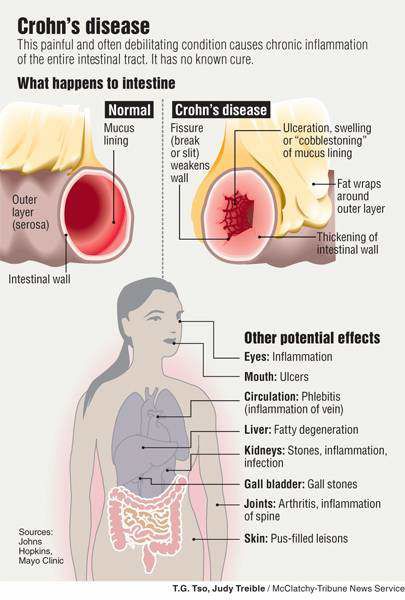Omega-3 acids fall short in helping Crohn’s disease
Published 5:00 am Thursday, May 1, 2008

- Omega-3 acids fall short in helping Crohn's disease
A new study may dismay some of those who suffer from Crohn’s disease, which causes inflammation in the digestive system.
Preliminary studies had shown promise for omega-3 fatty acids, found most often in fish oil supplements. However, a larger study of a new drug made primarily with fish oil found that the supplement did not help prevent flare-ups of the disease.
“We looked very hard to see if there were any benefits,” said Dr. Brian Feagan, a researcher at Robarts Research Institute in Ontario, Canada, and the lead author of the paper. “We could not identify any patients who were apt to benefit.”
Crohn’s disease is likely caused by an abnormal immune reaction in which the cells of the digestive system overreact to common items such as foods or innocuous bacteria. That causes chronic inflammation and leads to abdominal pain and diarrhea. Though symptoms can sometimes be alleviated, it has no known cure.
In the current study, researchers split about 740 people with Crohn’s disease into two groups. One group was given omega-3 supplements for up to 13 months, while the other group was given a placebo. At the end of the study, there was no difference in the rate of symptom flare-ups between the two groups.
“We don’t see a treatment effect,” said Feagan. For the company that hoped to market the new drug to those who suffer from Crohn’s, he said, “this is a fairly devastating result.”
In the past 10 years, said Feagan, treatments have come a long way. Still, there are limitations. The latest generation of drugs are known as immunosuppressants. Some of these are quite new; the Food and Drug Administration just approved the latest, Cimzia, on April 22. They can keep up to 40 percent of patients in remission, said Feagan, though they have serious side effects.
The primary side effect is an increased susceptibility to infections. Because the drugs suppress the immune system, people who take them, especially for a long time, are more prone to infections. Indeed, in the press release for the FDA’s new drug approval, the agency warns that “patients taking Cimzia should be educated about how to identify an infection.”
The side effects of medications can also influence nutrient absorption, which may mean that patients need to modify their diets, said Carol Schrader, a nutritionist at St. Charles Bend. For example, steroids, a common treatment for flare-ups, can reduce the absorption of vitamin D and calcium, she said, so people may want to consider supplements.
There are few solid recommendations for diet; the advice is usually as simple as, if it feels bad, don’t eat it. Many people, said Schrader, have a lactose intolerance. But some are finding that yogurt containing live bacteria can keep symptoms at bay.
Crohn’s is a “very individualized disease,” said Schrader.
“I have seen people with Crohn’s that can eat everything,” she said, though she advises people to back off from raw fruits and vegetables when they are having a flare-up.






